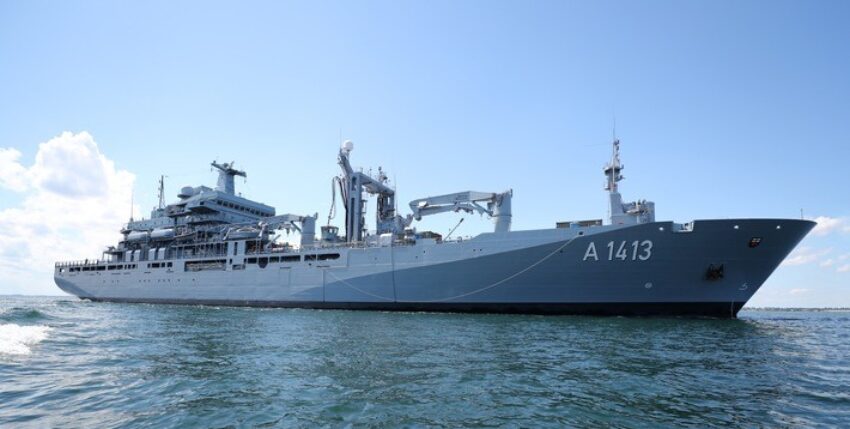Replacement for the frigate "Lübeck"
On Friday, 20 May 2022 at 4 p.m., the task force provider "Bonn" left Wilhelmshaven for the Mediterranean. In the Aegean Sea, the 175-strong crew and the ship can expect to work closely with the Turkish and Greek coastguards and the European Coastguard and Border Agency (FRONTEX) as part of Standing Nato Maritime Group 2 (SNMG 2). Under the command of frigate captain Eike Deußen, commander of the "Bonn", the Bonn will be deployed for six months.
The last few weeks have been characterised by intensive preparations for the deployment, with repairs and maintenance being carried out on the ship and training courses completed by the crew. Shore leave for the crew and a family reunion are planned again during the harbour phases. This gives the crew some variety and allows them to recover and recharge their batteries between sea phases. During the last deployment, no shore leave could be granted due to the applicable coronavirus regulations.
The departure of the ship took place without an invitation to the press and without publicity. A directive from the Federal Ministry of Defence stipulates that any form of troop movement is to be treated very restrictively due to the current crisis situation. As a result, no position of the "Bonn" can be determined on relevant platforms.
Background information on the support mission in the Aegean Sea
At the initiative of Greece, Turkey and Germany, the NATO defence ministers decided on 10 February 2016 to contribute to European measures against migrant smuggling in the Aegean Sea. To this end, the Standing NATO Maritime Group 2 (SNMG 2) task force was deployed to the Aegean Sea. The task force is deployed in the Aegean Sea between the Turkish and Greek mainland. It currently consists of four to seven ships. The ships operate both on the high seas and, since March 2016, in the territorial waters of both neighbouring states.
NATO is providing support in the Aegean Sea area - the ships have no sovereign powers. It is not their task to stop vessels or take action against smugglers - neither in foreign territorial waters nor on the high seas. Such powers lie with the national coastguards and other competent authorities.
NATO is also helping to improve the exchange of information between the Greek and Turkish coastguards and the European Union Border and Coast Guard Agency Frontex for border and coast guard operations in the Aegean. The ships provide Greek and Turkish authorities with information for a complete picture of the situation in the Aegean and on smuggling activities in the sea area. This is necessary in order to optimise the actions of the national authorities against smugglers and their networks.
Liaison officers from Turkish and Greek authorities as well as an official from the European Border and Coast Guard Agency Frontex are on board the German lead ship. They are the interface to their organisations and speed up the flow of information. In this respect, NATO serves as a cooperation platform for the neighbouring countries.
After peaking at around 853,000 people crossing the Aegean in 2015, the number initially fell sharply in the following years. In 2019, 83,300 migrants were registered in the Aegean.
This includes border crossings by land. Around 7,800 border crossings were registered between January and the end of May 2020. The Bundeswehr is participating with a warship and the unit is led by a captain at sea.










